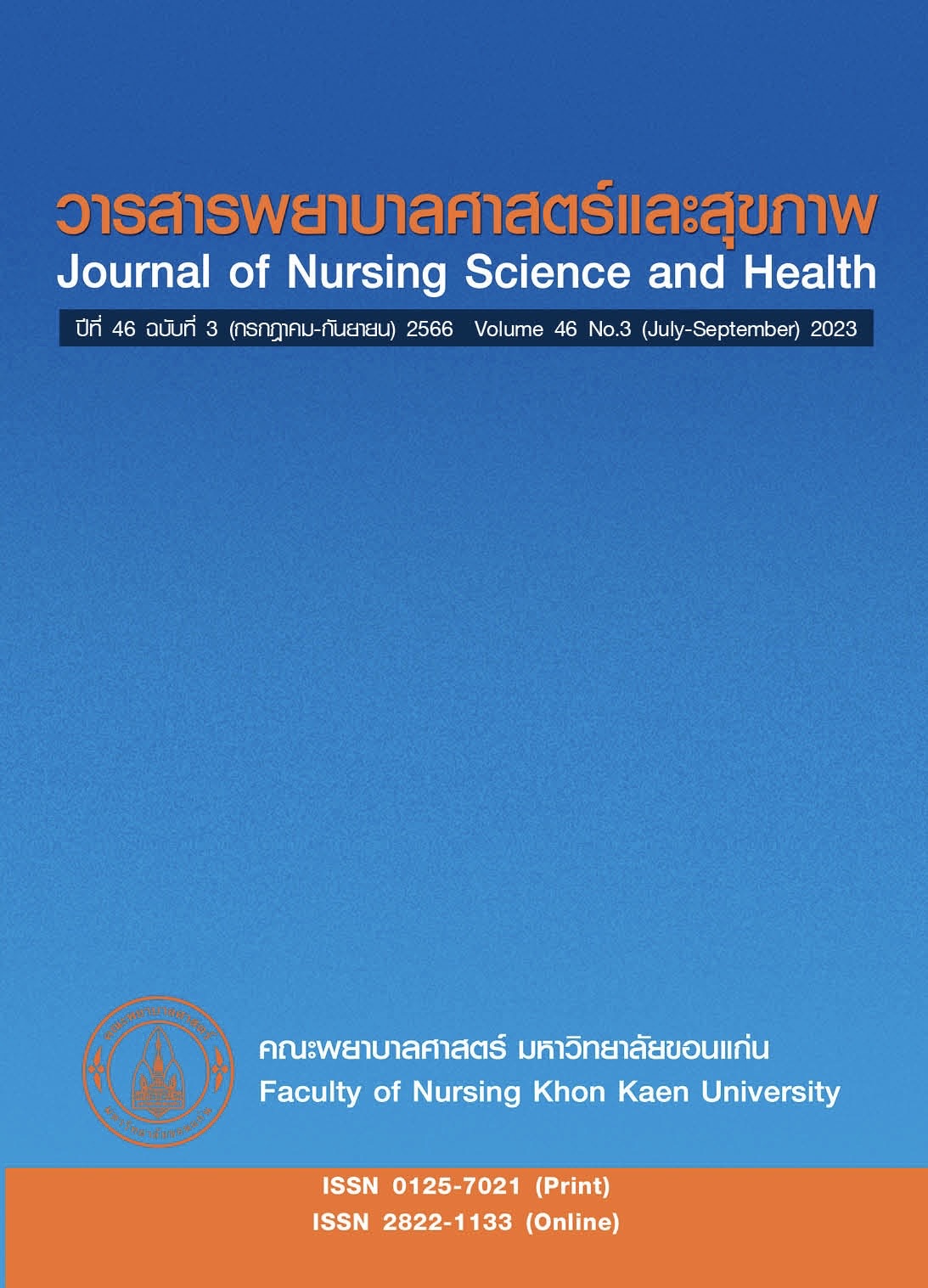การพัฒนาแบบประเมินการรับรู้สมรรถนะแห่งตนของมารดาต่อการส่งเสริมพัฒนาการทารกเกิดก่อนกำหนด
คำสำคัญ:
การพัฒนาแบบประเมิน , การรับรู้สมรรถนะแห่งตน , ทารกเกิดก่อนกำหนดบทคัดย่อ
ความสามารถของมารดาในการประเมินพัฒนาการของทารกเกิดก่อนกำหนดมีความสำคัญต่อการส่งเสริมพัฒนาการทารกให้ถูกต้องเหมาะสม มีผลต่ออัตราพัฒนาการไม่เหมาะสมตามวัยในอนาคตของเด็กปฐมวัย ดังนั้น การมีแบบประเมินที่มีความแม่นยำสูงจึงจำเป็นอย่างยิ่ง วัตถุประสงค์วิจัย เพื่อสร้างแบบประเมินการรับรู้สมรรถนะแห่งตนของมารดาต่อการส่งเสริมพัฒนาการทารกเกิดก่อนกำหนดวิธีวิจัย ใช้วิธีสุ่มตัวอย่างแบบเฉพาะเจาะจง กำหนดกลุ่มตัวอย่างคือผู้เชี่ยวชาญในการตรวจสอบแบบประเมิน จำนวน 3 คน และมารดาทารกเกิดก่อนกำหนดจำนวน 30 คน เครื่องมือสำหรับการวิจัย ได้แก่ แบบสอบถามความความคิดเห็นและข้อเสนอแนะของผู้เชี่ยวชาญ และแบบสอบถามตัวแทนมารดาทารกเกิดก่อนกำหนดหลังจากนั้นกำหนดวัตถุประสงค์ตามกรอบแนวคิดทฤษฎี กำหนดข้อคำถาม และตรวจสอบคุณภาพแบบประเมินการรับรู้สมรรถนะแห่งตนต่อการส่งเสริมพัฒนาการทารกเกิดก่อนกำหนด ผลการวิจัย ผลการตรวจสอบความตรงตามเนื้อหาได้ค่าดัชนีความตรงเชิงเนื้อหา (content validity index: CVI) เท่ากับ 0.90 และค่าความสอดคล้องระหว่างข้อคำถามกับวัตถุประสงค์ (item-objective congruence: IOC) เท่ากับ 0.67-1.00 ผลการทดสอบความเชื่อมั่นได้ค่าสัมประสิทธิ์แอลฟ่าของครอนบาค เท่ากับ 0.82 สรุปผลวิจัย แบบประเมินการรับรู้สมรรถนะแห่งตนของมารดาต่อการส่งเสริมพัฒนาการทารก เกิดก่อนกำหนดที่พัฒนาขึ้นมีความตรงตามเนื้อหาและความเชื่อมั่นของเครื่องมืออยู่ในระดับน่าเชื่อถือ จึงสามารถใช้ประโยชน์เป็นแนวทางการประเมินการรับรู้สมรรถนะแห่งตนของมารดาในบริบทที่คล้ายคลึงกันได้
เอกสารอ้างอิง
World Health Organization. Launch of the WHO recommendations for care of the preterm or low birth weight infant. [Internet]. Geneva: WHO; 2022 [cited 2023 May 10]. Available from: https://www.who.int/en/news-room/fact-sheets/detail/preterm-birth
National Statistical Office. Children youth 2021. [Internet]. Bangkok National Statistical office; 2021 [cited 2023 May 10]. Available from: http://service.nso.go.th/nso/nsopublish/pubs/e-book/Children_Youth_64/18-19/index.html
Ministry of Public Health. Summary of Ministry of Public Health examination results round 1, fiscal year 2022: Health promotion of pregnant women to prevent preterm birth (preterm), prevent non-communicable diseases (NCD), and care for the elderly. [Internet]. Nonthaburi: MOPH; 2022 [cited 2023 May 10]. Available from: https://atg-h.moph.go.th
Duangkid P, Chotibang J, Urharmnuay M. Effect of swaddling on sleep period of preterm infants. Nursing J 2019;46(3):181-94. (in Thai)
Gorzilio DM, Garrido E, Gaspardo CM, Martinez FE, Linhares MBM. Neurobehavioral development prior to term-age of preterm infants and acute stressful events during neonatal hospitalization. Early Human Development 2015;91(12):769–75. doi:10.1016/j.earlhumdev.2015.09.003
Health Data Center. Indicator report form PA 1.1 Year 2021: Early childhood development. [Internet]. Bangkok HDC; 2021 [cited 2023 May 10]. Available from: https://apps.hpc.go.th
Chumai T. Growth and development of early childhood. HHSK. 2016;1(2):18-33. (in Thai)
Wutthipittayamongkol P. Results of early childhood developmental assessment of at-risk children in the Lanna Child Development Integration Project at Lampang hospital. LMJ 2018;39(1):18-32. (in Thai)
Di Renzo GC, Roura LC. Guidelines for the management of spontaneous preterm labor. J Perinat Med 2006;34:359–66. doi:10.1515/JPM.2006.073.
Jantanavivat W, Nopmaneejumruslers K, Seree P. Effects of the language development program based on early childhood developmental surveillance and promotion. International journal of child development and men 2022;10(2):36-45. (in Thai)
Sakolwasan U. Knowledge, self-efficacy and behavior in promoting the development of preterm infants of primary caregivers. Chiang Mai: Chiang Mai University; 2007. (in Thai)
Yusoff MSB. ABC of content validation and content validity index calculation. Educ Med J 2019;11(2):49-54. doi:10.21315/eimj2019.11.2.6.
Davis LL. Instrument review: Getting the most from a panel of experts. Appl Nurs Res 1992;5(4):194-7. doi:10.1016/S0897-1897(05)80008-4
Duangthipsirikul S. Finding or developing data collection tools to answer metrics. [Internet]. Bangkok: Health intervention and technology assessment program; 2018 [cited 2023 Mar 16]. Available from: http://oec.anamai. moph.go.th/download/OEC_2016/MEET-TING2561/MAR2561/18_21Mar2018/Lecture%20Instrument.pdf
Vanichbuncha K. Using SPSS for windows to analyzedata.27th ed. Banngkok: Chulalongkorn University; 2015. (in Thai)
Hair JF, Hult GTM, Ringer C M, Sarstedt MA. Primer on partial least squares structural equation modeling (PLS-SEM). California, CA: Sage Publications; 2014.
Bandura, A. Social foundation of thought and action: A social cognitive theory. Englewood Cliffs, NJ: Prentice-Hall; 1986.
Therdbhuthadham T, Manu P. The influence of time management, self-esteem and self-efficacy on work happiness. Rajapark Journal. 2022;16(44):192-203. (in Thai)
Forrester JW. System dynamics, systems thinking, and soft OR. USA: School of Management Massachusetts Institute of Technology Cambridge, MA, 02139; 1994.
Sirited P, Thammaseeha N. Self-efficacy theory and self-healthcare behavior of the elderly. JRTAN 2019;20(2):58-65. (in Thai)
Likert R. The method of constructing an attitude scale, reading in attitude theory and measurement. edited by Martin Fishbein. New York : John Wiley & Son; 1967.
Wonginchan A, Tangpukdee J, Wonginchan S, Kearttiwongkru S, Khonggungong S. Development of an instrument for measuring health problem levels of school-aged children who have access to online media in the Thailand 4.0: IMHP-SaC. Journal of Nursing Science & Health 2022;45(1):98-111. (in Thai)
Turner RC. Indexes of item-objective congruence for multidimensional items. International journal of testing 2003;3(2):163-71.
Pan-inpang A, Phahuwatanakorn P, Limruangrong P. Effects of breastfeeding skill training program on efficiency, self-efficacy, and exclusive breastfeeding rate among first-time adolescent mothers. Nurs Sci J Thai 2021;39(4):27-40. (in Thai)
Ann O’Leary. Self-efficacy and health. Behaviour Research and Therapy 1985;23(4):437-51.
Leviton A, Patel AD, Loddenkemper T. Self-management education for children with epilepsy and their caregivers. A scoping review. Epilepsy Behav 2023;144:109232. doi:10.1016/j.yebeh.2023.109232.
Srisatidnarakul B. The methodology in nursing research. 5th ed. Bangkok: Chulalongkorn University; 2010. (in Thai)
Prasith-rathsint S. Social science research methodology.14th ed. Bangkok: Samlada; 2007. (in Thai)
ดาวน์โหลด
เผยแพร่แล้ว
รูปแบบการอ้างอิง
ฉบับ
ประเภทบทความ
สัญญาอนุญาต
ลิขสิทธิ์ (c) 2023 วารสารพยาบาลศาสตร์และสุขภาพ

อนุญาตภายใต้เงื่อนไข Creative Commons Attribution-NonCommercial-NoDerivatives 4.0 International License.
วารสารพยาบาลศาสตร์และสุขภาพเป็นเจ้าของลิขสิทธิ์ในการเผยแพร่ผลงานที่ตีพิมพ์ห้ามผู้ใดนำบทความที่ได้รับการตีพิมพ์ในวารสารพยาบาลศาสตร์และสุขภาพไปเผยแพร่ในลักษณะต่าง ๆ ดังนี้ การนำบทความไปเผยแพร่ออนไลน์ การถ่ายเอกสารบทความเพื่อกิจกรรมที่ไม่ใช่การเรียนการสอน การส่งบทความไปตีพิมพ์เผยแพร่ที่อื่น ยกเว้นเสียแต่ได้รับอนุญาตจากวารสารพยาบาลศาสตร์และสุขภาพ



